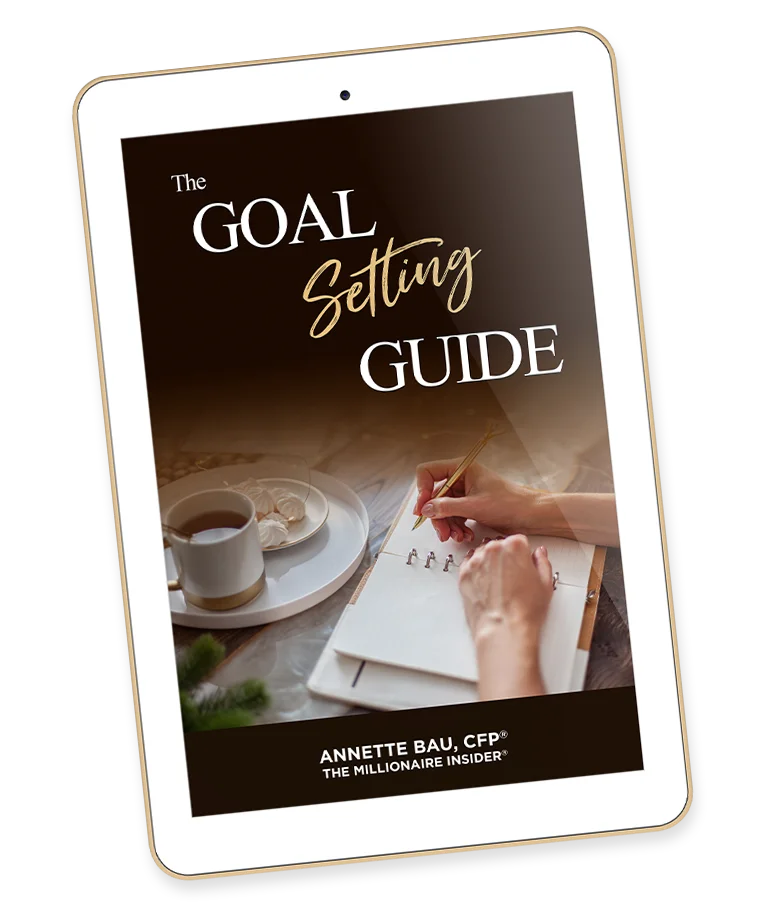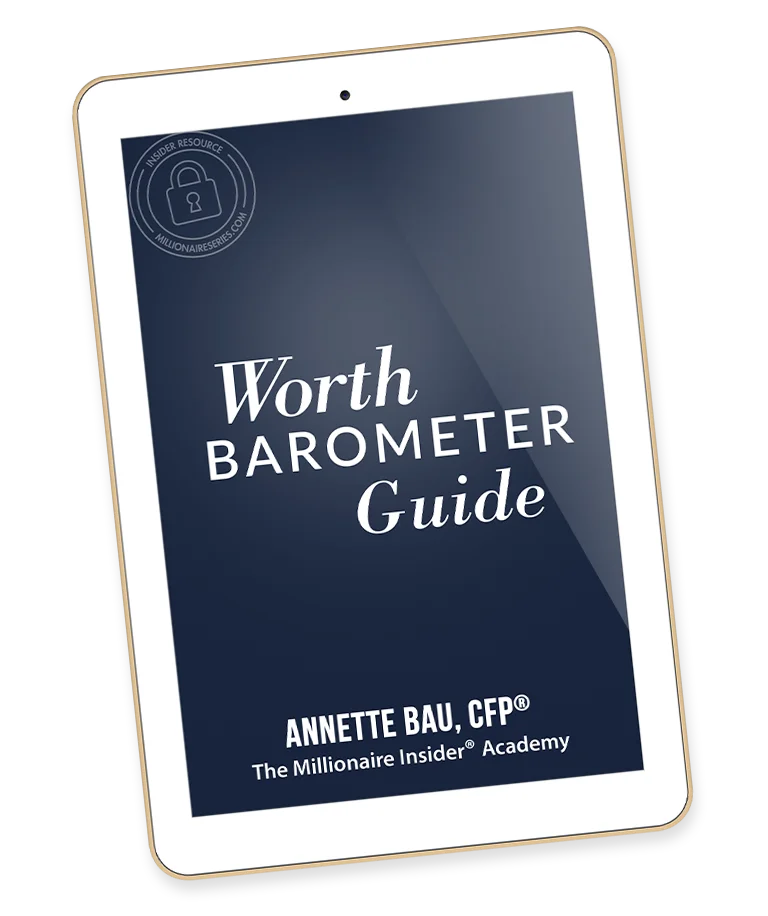Updated December 29th, 2023.
Did you know research shows that up to 92% of people give up on their New Year resolutions by January 19th? It is hard to believe that only 8% of people actually stick with their goal for more than 19 days!!
According to another study published in the Journal of Clinical Psychology, just 46% of people who set resolutions were successful. That means more than 50% of the people who set a goal fail to achieve it.
Whether your upcoming year’s objective is to lose weight, spend more time with friends and family, learn new skills, increase the hours of sleep you get each night, or perhaps achieve a significant financial milestone, now is a great time to start.
Making it a habit to set goals on or before New Year’s Eve works well.
Disclosure
All materials and intellectual property are copyrighted by MillionaireSeries.com®.
This information is for educational purposes only. It is not intended to replace any advisor or specialist or provide any investment, financial, tax, retirement, planning, or healthcare advice.
By reading this, you agree to hold MillionaireSeries.com® and its affiliates harmless for results achieved or not achieved.
The Best Time to Set Your New Resolutions
While no one size fits all for when to set your goals, the first step is to create a list of resolutions you want to achieve. 
Start with three to five. Here are some examples:
- Reduce stress
- Stop procrastinating
- Start a spending plan
- Break bad habits
- Reduce social media
- Eat healthier
- Maintain weight loss
- Increase energy and feel good
- Stop playing video games
- Begin an exercise program
For many, the year’s end is a great time to undertake small and large goals. For example, if your goal is starting a new hobby, schedule time into your calendar every other week instead of every week.
And because no one wants to fail, today, you will learn the step-by-step process to accomplish your resolutions to achieve your short and long-term results.
Before we dive into the training, let’s review some ideas to get your creative juices flowing.
As you develop ideas, keep in mind that it is recommended that you begin with one to three top priorities for what you want to achieve in the upcoming year.
New Year Resolutions and Ideas
Drink more water

While this may seem like a silly goal, it is critical to our health.
Many experts recommend drinking 50% of your body weight in ounces daily. You may need more if you exercise or partake in strenuous activities. For optimal digestion, drink water 30 minutes before or an hour after a meal. It is best to refrain from drinking any beverage during a meal.
For example, if you weigh 130 pounds, you will drink 60 ounces of water daily, a little under 8 cups (assuming 8 ounces are in a cup).
To avoid disrupting your sleep because you must urinate from the extra water you drink, spread it out as follows: drink 25% of your daily water intake when you arise in the morning, then another 25% mid-morning, followed by 25% before or after lunch, and the final 25% before dinner.
Then, if you are thirsty after dinner, sip water or a small amount of herbal tea. This strategy will reduce your likelihood of disrupting sleep.
Another tip is to lay on a slant board. Over time, gravity pressures our organs, including our bladder. The slant board relieves stress and improves our ability to sleep through the night without urinating.
If you don’t have a slant board, you can improvise  with an ironing board that you raise on one end so that your head is below your heart and legs. Be careful to ensure it doesn’t fall over.
with an ironing board that you raise on one end so that your head is below your heart and legs. Be careful to ensure it doesn’t fall over.
Get more active
As horrifying as it sounds, sitting is the new smoking, so setting this goal could improve your health and even save your life.
The secret to becoming more active is to find an activity you enjoy. For many, outdoor activities, such as hiking, walking, biking, running, or skiing, are at the top of their list. Or, you may prefer a treadmill, elliptical, rowing machine, Zumba class, kickboxing or self-defense class, or a combination of activities.
Experts recommend that an ideal exercise program includes cardiovascular exercise, yoga, and weight training. Commit to 10,000 steps and 20-30 minutes of yoga daily, and three to four 60-minute weight training sessions weekly.
The point is that you consistently stay active and ideally do something you truly enjoy. If you do not like an activity, such as weight training, but you know how important it is and how much better you feel because of the exercise, find a partner to work out with and hold you accountable. In addition, reward yourself when you complete a certain number of classes. I find weight training hard and boring. So, I started going to a gym. It was a great decision; now, six months later, I feel stronger and healthier.
Increase your rest and relaxation time

In this 24/7, always-on workplace, our downtime often suffers. When we do not have enough time to rest, relax, and rejuvenate, it hurts our creativity and productivity.
If you are a type A personality, scheduling downtime into your calendar goes a long way to making it a reality. Another effective strategy is to identify consequences for your actions.
A key part of rest is sleep. Experts recommend 7 ½ to 8 ½ hours of sleep each night. Remember that you typically are awake 30 to 90 minutes each night, so you must include that in your total sleep time. For example, if you go to bed at 10 PM and are awake for 30 minutes, you must sleep until 6:30 AM to get eight hours. It is recommended to set your room temperature between 68 and 72 degrees.
Another great tip is to reward yourself if you meet your commitment. For example, if your goal is to meditate for 30 minutes daily or start saving 10% of your paycheck, the consequence may be to get a massage or play a round of golf with friends on Friday. If you don’t complete the daily meditation objective, you must donate to your least favorite political organization or special interest group. Consequences generally work best when a third party holds you accountable for achieving your goal.
Become more eco-friendly
While many of us feel that it is difficult,  if not impossible, to impact the environment, we can do our part by focusing on small actions.
if not impossible, to impact the environment, we can do our part by focusing on small actions.
Whether we use a refillable water container versus a plastic bottle, recycle, install solar energy, plant a tree, drive a fuel-efficient vehicle, or use an alternative means of transportation, we feel empowered knowing we are doing our part to impact the environment positively.
Volunteer for the less fortunate
Many would agree that spending time with others less fortunate than us makes us appreciate what we have and see how truly blessed our lives are.
The list of volunteer options is endless. Examples include animal shelters, seniors, children, cancer survivors, food banks, and disabled veterans.
Volunteering for a dog shelter or an organization that houses women and children who have escaped an abusive situation does wonders to elevate your purpose, meaning, and value.
In addition to improving the lives of those less fortunate, you can meet others who share your interests, making this option a win-win for all.
Take some quiet time and determine the impact you want to make on the people whose lives you want to affect. Then, start researching options and schedule regular volunteer time at your chosen organization.
Turn off the TV or other electronic devices

Electronic devices stimulate our nervous system. Taking a break and focusing instead on activities, such as spending time with family and friends, reading inspirational books and quotes, meditating, positive prayer, yoga, chants, focus breathing, silent walks or hikes, visioning, and stating affirmations, can dramatically improve our mental health and attitude.
A great start includes turning off electronic devices 60-90 minutes before bed and taking a break from TV Monday through Thursday.
Conclusion – How to Set New Year Resolutions and Achieve Your Goals
The best time to start setting new goals and resolutions was yesterday; the next best time is today. So, regardless of where you are, schedule time to set goals for the upcoming year.
While the list of goals is endless, the six ideas I shared in this article are good starting points.
The secret is to get clear on what you want and then laser-focus on achieving those goals!
You will be so glad you did.
Click here to get your free financial checkup:
For research on how to better achieve goals, access Gail Matthews’ study from the Dominican University here: Goal Setting and Achieving Research
Click here to learn more about setting and achieving your goals.
Click here to learn my goal setting process.
In this episode, I show you the exact process of setting goals so that you can achieve them.
Specifically, you will learn:
- The process to make your resolutions stick
- The formula to achieve results, including financial goals
- Where to start when setting resolutions
- The critical goal-setting step that makes your dream a reality
- How to program your goal into your subconscious mind
- How to simplify the process of setting goals
- Why realistic targets can (and often do) keep you stuck
- Why most people give up on the goals within the first 20 days
- How long it takes to achieve a habit so you can achieve your objective (No, it is not 21 days.)
- How to reprogram your brain so that you can achieve your goal (This one insight will change your life forever.)


